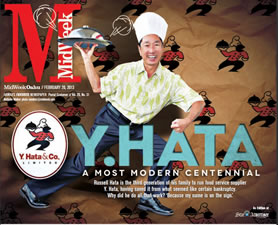Y.HATA – A Most Modern Centennial
Russell Hata is the third generation of his family to run food service supplier Y. Hata, having saved it from what seemed like certain bankruptcy. Why did he do all that work? ‘Because my name is on the sign.’
It’s an exciting time at Y. Hata & Co. The local food-service distributor is celebrating its 100th anniversary and looking forward to the next 100 years.
Russell Hata
To mark the occasion, its headquarters at 285 Sand Island Access Road is spruced up with fresh paint and new contemporary décor. Employees hail kukila i ka nu’u (strive for the summit).
A centennial comes once in a lifetime, so Y. Hata is taking the opportunity to rejuvenate and fortify itself for a new era. It cleverly positions itself as a “brand new century-old company.” But there is honesty and strategic fervor in that tag that belies the company’s story of endurance and survival. Just 20 years ago, it was on the brink of bankruptcy with its banker commanding “shut it down today.”
How did it survive that stormy time, and what gave it the will and resilience to keep on trucking? How has the turnaround affected employees and customers? With profitability restored, what else can it now deliver to our community besides food products to restaurants and institutions?
To get answers, we head to the office of Russell Hata, third-generation chairman and chief executive officer of Y. Hata & Co. Ltd., to whom credit is given for orchestrating the turnaround.
The thriving enterprise operates in a 107,000-square-foot office and warehouse that is stark contrast to the tiny Big Island garage where it all began. As we view a wall of historic photos, Hata turns back the pages of time. The company’s story is folksy but has lessons to which all businesses can relate.
Y. Hata & Co. was started in Hilo in 1913 by Russell’s great-grandfather, Yoichi Hata, an immigrant from Hiroshima. He and wife Nacko ran a small wholesale products operation and sold candies in front of their residence. Yoichi expanded the business rapidly and accumulated enough wealth to educate his 10 children at top universities. The youngest, Frank (Russell’s dad), tended to the family business at a young age.
Now chairman-emeritus, Frank recalls, “I used to play hooky from school and go to the pier to haul rice from the ship with my brother.”
Older brother Minoru moved to Honolulu in 1938 to expand Y. Hata. Frank was sent to help him during the summer.
During World War II, patriarch Yoichi was interred in New Mexico as an enemy alien while Frank and brothers served in the U.S. military. Sister Yukiko Hata ran the Hilo operation, and Minoru remained in Honolulu to oversee the business.
After serving in Europe, Frank returned home to attend the University of Hawaii and work at Y. Hata. He led the company expansion through diversification and acquisition during the post-war years.
Y. Hata’s distribution line moved into tobacco, beer franchises, dry goods, grocery stores, warehousing, Asian merchandising and trading.
One of Frank’s business partners was the late Maurice Sullivan, founder of Foodland Super Market, with whom he established Pacific Warehouse, a storage facility for wholesalers.
By the 1990s, Y. Hata was the dominant food distributor in the state. Difficult times were experienced, however, when the company nearly went bankrupt during the 1971 shipping strike. The worst blow came in 1994 when its Ilalo Street property and distribution center in Kakaako was condemned by the state under then-Gov. Ben Cayetano for future development of the UH medical school.
Russell recalls the anxiety. “They first gave us seven days to move out, then we negotiated two years so we had to be out of Ilalo by 1996. The worst part was watching a company that became very powerful in the state slowly decline without being able to help it,” he says.
Russell had worked at Y. Hata as a youngster, doing after-school duty in the stock room and handling janitorial chores. He completed his education at Kalani High School (’73) and University of Hawaii, majoring in business/finance and mastering the Executive MBA program.
He returned to the company in 1991 working for his Uncle Minoru.
“When I took over the company a second time, we had two computers,” Russell remembers. “One was broken, one worked.”
But fixing “broken” situations seems to be Russell’s calling. The knowledge gained at college plus work experience in Hawaii and the Mainland prepared him for a prophetic call in 2008 when his father asked him to return to Y. Hata for a third time. The company was being riveted by external forces, including a stagnant economy, challenging competition and the ever-advancing march of technology. An earlier attempt to sell the company had been unsuccessful.







